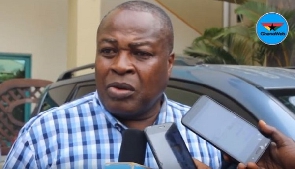Accra, July 26, GNA - The Value Added Tax (VAT) Flat Rate Scheme will begin operating effective September 1, 2007, Mr Anthony Ewereko Minlah, Commissioner of VAT Service, announced at the launch of the scheme on Thursday.
The Vat Flat Rate Scheme is a simplified tax collection system that will ensure that retailers of goods and supermarkets charge VAT/NHIL at a marginal rate of three per cent.
Addressing members of the Ghana Union of Traders Association (GUTA), Mr Minlah noted that it was a social obligation for people to voluntarily pay taxes due the state and urged the consuming public to always demand VAT receipts/invoices for services and goods they paid for.
The VAT Commissioner noted that credible enforcement of the scheme was an integral part of any compliance strategy as it acted not only to deter tax evasion but also served to remind taxpayers that the VAT Service was working to maintain the fairness of the tax system by ensuring that everybody paid their share.
Mr Minlah said cooperation between the VAT Service and businesses was the foundation for meeting the challenges of the future and commended GUTA for their contribution in making the scheme a reality. "However, co-operation should not be misconstrued to mean that the service will wink at wrong doing," he said.
He stressed that the Service would not hesitate to apply sanctions to defaulting traders and urged all qualified traders and businesses to voluntarily register if they had not already done so.
"The Commissioner of the VAT Service may also compulsorily register any business that qualifies but refuses to apply for registration." The punishment for businesses that deliberately refuse to register is a fine of 10 million cedis or imprisonment for a term not exceeding five years or both.
In addition businesses or individuals will be liable to pay the amount of tax not collected on taxable sales made from the date registration should have taken place.
He said VAT officers had been on the field to conduct one-on-one education and registration of businesses in the retail sector and had so far registered over 3,000 new retailers.
Mr Kwadwo Baah-Wiredu, Minister of Finance and Economic Planning, who officially launched the scheme, noted that the fundamentals of any economy included a strong revenue base and Ghana was no exception. "Tax revenue plays a crucial role in the economy. It represented about 21 per cent of the Gross Domestic Product as at December 2006, up from about 16 per cent in 2000," he said.
Giving statistics, the Finance Minister said the country's revenue envelope was only 54.3 trillion cedis (GHC 5.43 billion) out of which 37.5 trillion cedis (GHC 3.75 billion) was realized from domestic taxes. He said in the 2007 budget, the country's total need was projected at 100 trillion cedis (GHC10 billion) hence the remainder of the country's need came as support from development partners.
"Let me put it simply: Our domestic revenue is far lower than our development needs. This is critical for all of us, not only for the government."
Mr Baah-Wiredu expressed concern about the inability to meet the revenue target and said it meant the government would not be able to provide the needed public goods.
Explaining further, he said the low revenue generation also meant that government must go borrowing from banks.
He thanked GUTA for proposing the concept of a flat rate scheme for the informal retail sector and said it was a good example of public private partnership.
Mr. Baah-Wiredu said efforts were being made to ensure a smooth implementation of the scheme and called for more publicity messages in the form of flyers and brochures targeted at both consumers and retailers.
Mr. Osei Kwabena, Chairman of Revenue Governing Board, said the scheme marked a significant step in simplifying the tax collection system.
He stressed the need for all businesses to voluntarily register and comply with the VAT Flat Rate Scheme saying it was a step in the right direction, which would ginger voluntary compliance.
Mr George Kwaku Ofori, Acting President of GUTA, who also advocated that all traders should be part of the scheme, said members of the association had earlier complained that the 12.5 percent paid was high. He, however, said members had now agreed to work with the three per cent while identifying problems associated with the implementation for future review.
Mr Ofori urged businesses, which had not yet registered to do so as a matter of urgency to avoid facing penalties.
The VAT Service donated three vehicles to GUTA to facilitate their contribution of educating the public about the scheme.
Click to view details



Business News of Thursday, 26 July 2007
Source: GNA
















